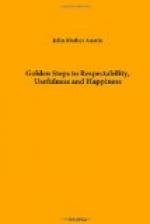Question the old man—the aged traveller—who has passed over this pathway of life, and is just ready to step up into the mysterious road of a higher existence. Ask him as to his experience—beseech him for advice. Looking back through the vista of his long and chequered way, of light and shadow, of joy and sorrow, he will exclaim—“O ye youthful! Give heed to the admonition of the wise man—’Ponder the path of thy feet, and let all thy ways be established.’”
The admonition of the text is important in reference to the Habits and Amusements of the youthful. We are all more or less the creatures of habit. Our ways, from earliest infancy, are more the result of the force of habit, than we are generally aware. The actions, words, and thoughts of men, form for themselves certain channels, in which they continually seek to flow, unless turned aside by a strong hand, and a painful effort.
Habits are formed insensibly. We are not aware of any moment when they are created; but the first consciousness of their being fixed upon us, is, when their great power is felt impelling us strongly to certain courses. A single deed does not create a habit. One thread of hemp forms not a rope. It contains but a very slight amount of strength. But when a large number of threads are laid and twisted together, they make the mighty cable, which, attached to the ship, enables lier to bid a proud defiance to the fierce gales and mountain billows of ocean. Thus the young are continually, yet unconsciously, spinning the threads of habit. Day by day the strands increase, and are twisted tighter together; until at length they become strong and unyielding cords, binding their possessor to customs and practices which fix his character and prospects for life.
It is of the greatest importance that the young should inquire faithfully into the nature of the habits they are forming. They should not fall into self-deception—a common error, on this subject. The love of indulgence should not be permitted to blind them to the legitimate consequences of careless habits. Let them look abroad on their fellow-beings, and critically study the tendencies and fruits of their habits. When they see one prosperous in life—one who is respected, confided in, and beloved by all—who leads a quiet, pleasant and peaceful life,—mark his habits, and strive to imitate them. They will bless them as well as him, if faithfully practised. And when they behold a man disliked and despised by




